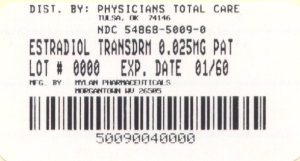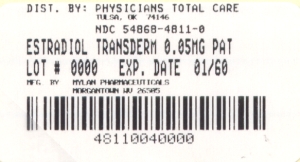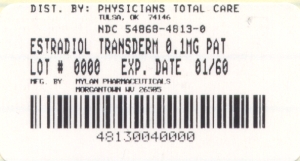Estradiol Patch while Breastfeeding

What is Estradiol Patch used for?
Is Estradiol Patch usage safe while breastfeeding? If a lactating mother is using it can there be any effect on growth or development of infant?

Estradiol Patch Breastfeeding Analsys
Estradiol while Breastfeeding
Low RiskCAS Number: 50-28-2
A natural Estrogen that is marketed for oral, injection and topical administration (skin and vaginal).On the chemical form of valerate, it is used in association with a progestin as a combined birth-control compound (e.g. Estradiol + Dienogest) Estradiol is excreted into breast milk in clinically non-significant amount (Nilson 1978) and no problems have been observed in infants whose mothers were treated (Pinheiro 2016). Plasma levels of these infants were undetectable or very low (Pinheiro 2016). After administration in the form of transdermal patches milk levels have been undetectable (Pinheiro 2016, Perheentupa 2004). Despite these data, an older publication associated the use of transdermal estradiol with a case of jaundice and poor weight gain (Ball 1999).There is greater passage to milk when the administration is vaginal. There is evidence (albeit inconsistent) that estrogen-containing pills may decrease milk production, especially during the first few weeks postpartumThey may reduce the protein content of the milk. No problems have been observed in infants whose mothers were treated, except some cases of transient gynecomastia in infants whose mothers were receiving a higher dose than usual. Estrogen exposure in childhood or adolescence, does not influence the subsequent production of milk. The American Academy of Pediatrics states that this medication is usually compatible with breastfeeding.
Estradiol Patch Breastfeeding Analsys - 2
Estradiol while Breastfeeding
CAS Number: 50-28-2

Limited information on the use of estradiol during breastfeeding indicates that the route of administration and dosage form have influences on the amount transferred into breastmilk. Vaginal administration results in measurable amounts in milk, but transdermal patches do not. Maternal doses of up to 200 mcg daily transdermally do not increase estradiol or estriol in breastfed infants or cause any adverse effects in breastfed infants. Vaginal administration results in unpredictable peak times for estradiol in breastmilk, so timing of the dose with respect to breastfeeding is probably not useful. A case report of inadequate milk production and inadequate infant weight gain was possibly caused by transdermal estradiol initiated on the first day postpartum, but 2 small studies found no such effect when the drug was initiated after lactation was well established.

What should I do if already breastfed my kid after using Estradiol Patch?
During whole lactation period you shall first discuss with your doctor and then together you shall decide whether you shall take that drug or not however if you have already taken Estradiol Patch then you shall inform your doctor, But you should not be worried too much as Estradiol Patch comes in category of low risk drug.
I am nursing mother and my doctor has suggested me to use Estradiol Patch, is it safe?
Estradiol Patch comes in category of low risk and if your doctor is aware that you are breastfeeding it should be ok to use
If I am using Estradiol Patch, will my baby need extra monitoring?
Not much
Who can I talk to if I have questions about usage of Estradiol Patch in breastfeeding?
US
National Womens Health and Breastfeeding Helpline: 800-994-9662 (TDD 888-220-5446) 9 a.m. and 6 p.m. ET, Monday through Friday
UK
National Breastfeeding Helpline: 0300-100-0212 9.30am to 9.30pm, daily
Association of Breastfeeding Mothers: 0300-330-5453
La Leche League: 0345-120-2918
The Breastfeeding Network supporter line in Bengali and Sylheti: 0300-456-2421
National Childbirth Trust (NCT): 0300-330-0700
Australia
National Breastfeeding Helpline: 1800-686-268 24 hours a day, 7 days a week
Canada
Telehealth Ontario for breastfeeding: 1-866-797-0000 24 hours a day, 7 days a week
